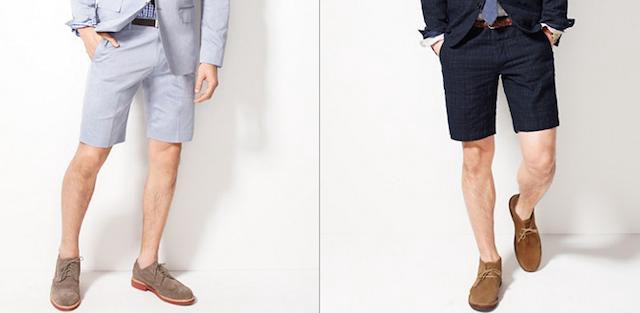What to Say to a Man in a Short-Suit

♫ Shorts, shorts, shorts, short shorts ♫:
At this summer’s weddings and white parties, the nattiest gentlemen will be wearing shorts with a corresponding suit coat. At least, that’s what J.Crew would have you believe, along with a few other menswear companies that are giving the look a hard sell this season…
From all perspectives, the short-suit is an odd pairing. Sartorially, the look is equal parts business and schoolboy. Functionally, it’s both breezy and stifling, and socks are a no-no, unless they go up to one’s knees. The list of people who can pull it off doesn’t stretch much beyond professionals in Bermuda and street-style icons such as Nick Wooster and Pharrell.
A minor problem with this, one maybe not apparent from the design studios and agency meeting rooms of New York, is that a crude variation of this style is already popular, particularly in the easternmost regions of the Southern Frat Belt (one of at least four belts and one midwestern quadrilateral zone). Just loosen the fit and add either neon Wayfarers or an Oakley/Croakies combo. Put a red cup in the hand. Bad look. Death. If you look like a model, and your short-suit fits perfectly, maybe you can pull this off. If you carry yourself like anything BUT a model, your best possible outcome is looking sort of like Angus Young.
There is also the moral dimension, but it is complicated.
What often comes to mind when I see things like this is an image of an older man, who is one part my dearly departed grandfather and one part everyone else’s, politely declining to comment on his grandson’s outfit. This grandson remembers his grandfather’s story about the first suit he bought as an adult, during the Great Depression, with paychecks from the slaughterhouse where he swept blood after hours. He kept it for years, and its legs were ironed, straight, and full.
But when grandfather gently changes the subject, he wants to talk about time, about all the things he doesn’t know and never will, and how what he is most proud of, after the times he stood up for helpless people, is how he tried never to get in the way of the young ones with energy — not the zealous wide-eyed monsters, but the few who somehow knew, intuitively, how to assert themselves with candor and humility. The children are the future, and the preternaturally wise are their corrective. Change is good.
Then I still think he would ask, eventually: Can you please change?
